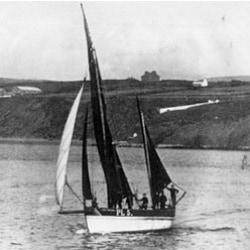THE LOSS OF THE HERRING BOATS
Articles from the Isle of Man Part 1 of 2

The following is from MANX BALLADS, 1896.
There must have been some bad weather on the Isle of Man at times as the following graphically describes the loss of several boats of the Herring Fleet in the year 1787. As many people from the Isle of Man were dependant on the sea for survival, the loss described below must have had a devastating effect on the Manx population. There would have been many widows and fatherless children left behind.
I leave you to read the following and imagine the tragedy and its effects.
LOSS OF THE HERRING BOATS
Recall ye, old and young,
Seventeen hundred Eighty and seven,
on Douglas sea,
As it came to pass,
There was good fishing,
With weather so fair and delightful.
Yet ‘twas not for long,
The weather was calm,
Ere the week had come to an ending,
The look of the sky
Showed there was danger,
That a very fierce storm was at hand.
Wildly on St. Matthew’s Eve,
While the fleet was at sea,
Came a storm, and part were divided
From all that was dear
To their hearts, even
Life, by the fierceness of the ocean.
It is hard to say
How many there were,
On Matthew’s Eve, very sick at heart;
Children fatherless
Were sadly crying,
And women looking for their partners.
Through Kirk-Christ Parish
Was woe and pity,
Women seeking for their defenders,
Tom Kinley’s boat crew
They were crying for,
And John Moore’s of Croit-y-Caley too.
Tom Qualtrough also
Was lost the same eve,
With the rest of his men, not a man
Was alive, not one
Of his twenty-one;
Their friends were most bitterly weeping,
It was a fair eve
When they sailed away
From Douglas with all the other boats;
And they reached the place,
Where the herrings were got,
Without thought of danger or harm.
But short was the time
The weather it changed,
The wind from the eastward blew strongly;
Soon swelled high the sea,
With uproar and storm,
Fiercely down came the tempest and rain.
Then hoisted they soon
Sail before the wind,
Straight for the port of Douglas sailing;
When they reached the bay,
The tide was far out,
And the weather much worse had become.
Anchored in the bay,
Quite close to the shore,
What would become of the boats riding?
It was so very dark,
No light on the quay,
In fear of their death they were waiting.
To wait on the sea
Till the tide came in,
It was indeed a fearful distress;
The cables were failing,
And vessels were sinking,
Splitting in pieces, going aground.
It was so black dark,
No hill they could see.
Straight over them the waves were foaming;
How dreadful it was,
With tempest and mist,
To run before the wind to the land.
Terrified by the sea
With storm and uproar
The waves just like mountains were rising;
During all that time,
The sea breaking white,
They could not see the port they desired.
An hour before day,
‘Twas thought was the time
When Qualtrough went to run for the land;
‘Twas he and John Moore
Were lost the same hour,
And the whole of their crew with them too.
As well was Kinley,
On leaving the bay,
Unable to find the way to run;
At the darkest time,
He struck ‘gainst the quay,
And his boat was immediately sunk
There were no means for
Them to escape,
For death was before their very eyes;
Bitter was their cry,
With their hearts melting,
So many were there at first sinking.
They could have no choice
To make trial of
Their skill, so packed were they together;
Good seamen were they,
Yet in that moment
The waves of death covered them over.
All their dearest friends
Had cause to shed tears,
Both wives, widows and little children too;
With sorrowful sighs,
They were taken home,
And buried among their own people. .
Submitted by Elizabeth Feisst, Bundaberg Queensland, Australia
January 2001
© 2021 by Malcolm Qualtrough, Elizabeth Feisst and the late John Karran Qualtrough.
Hosted by Ask Web Design, Isle of Man.
© Copyright by Malcolm Qualtrough, Elizabeth Feisst and the late John Karran Qualtrough.